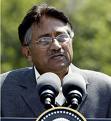Only Pak Army can determine how long Musharraf lasts in power: CSM
 Islamabad, Nov.5: Pakistan ’s decision to declare a state of emergency on Saturday, has little to do with terrorism, and more to do with neutralising an opposition that was building up against him, says a Christian Science Monitor (CSM) report.
Islamabad, Nov.5: Pakistan ’s decision to declare a state of emergency on Saturday, has little to do with terrorism, and more to do with neutralising an opposition that was building up against him, says a Christian Science Monitor (CSM) report.
Quoting analysts, the CSM further goes on to say that the emergency order marks an important moment for former Prime Minister Benazir Bhutto.
As an opposition figures who has not been arrested, she is uniquely situated to rally the masses against Musharraf, says Hassan Askari Rizvi, an independent political scientist.
Whether or not she does could determine how long Musharraf survives politically.
"Much depends on Bhutto. If she decides to go to the streets, it can make an impact," says Professor Rizvi.
Over the long term, Musharraf's decision could expose his weaknesses further.
Indeed, to many, the move seems an eerie echo of decades past, when Pakistan's three previous military rulers lost their legitimacy yet held desperately to the scraps of power. Eventually, the Army itself ousted some of them – fearing they had become a liability.
"The pattern is so similar. It looks like the last efforts of a dictator who is out of touch with reality," said Hassan Abbas, a Pakistan expert at Harvard University.
Musharraf, according to most analysts, is still perceived to be too important an ally to antagonize – even with January's parliamentary elections hanging in the balance.
"The US is in a very awkward position," says Professor Abbas.
There is little evidence, though, that the order has any real relation to terrorism, say experts and security analysts.
Pakistani-based extremists are not a threat to the solvency of the state and emergency rule unlikely to change the Army's fortunes in fighting them.
"Martial law does not add to his strength in terms of the forces on the ground," says Shafqat Mahmood, a columnist for the newspaper The News.
Most analysts agree that the timing of the order was probably linked to the Supreme Court, which was set to decide this week whether Musharraf's re-election as president in October was illegal. Opponents argued that his dual post of president and Army chief was unconstitutional.
In declaring a state of emergency, Musharraf has cleared the court of those most likely to oppose him, including the independent-minded chief justice, Iftikhar Chaudhry, whom he had also tried to oust in March, unsuccessfully.
When Musharraf previously attempted to remove Mr. Chaudhry, lawyers led nationwide protests with political parties and civil society groups, eventually forcing Musharraf to relent. But it is uncertain whether lawyers will be able to mount a similar campaign now that the Constitution has been suspended and all the lawyers' leaders jailed.
"I cannot see the movement as it was previously," says Asma Jehangir, a Musharraf critic and lawyer, who says she is now under house arrest. "People have to be led" and there is no leadership left.
In the end, though, the final word will almost certainly lie with the Army, says Rizvi.
"That is the only institution that can take him out or put him in power," he says. (ANI)